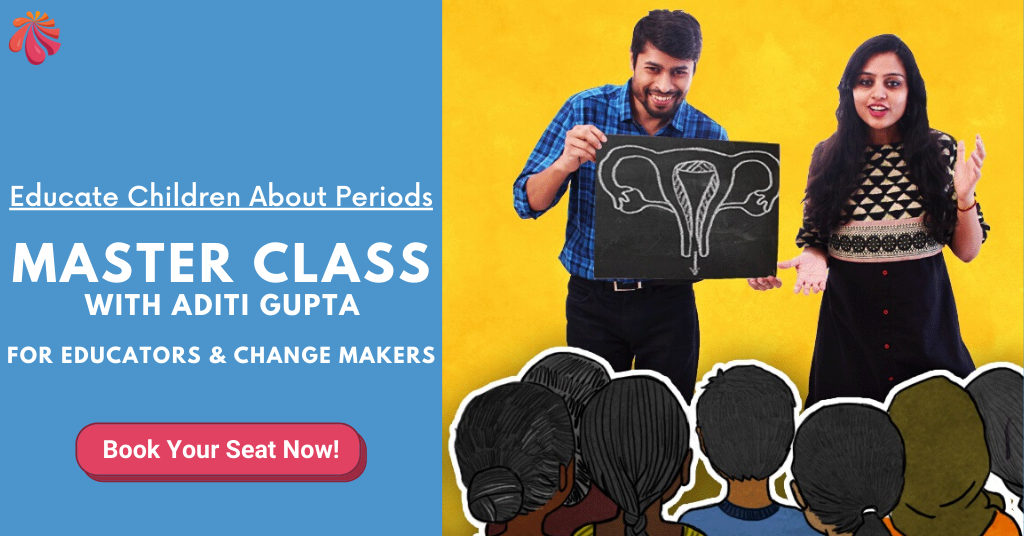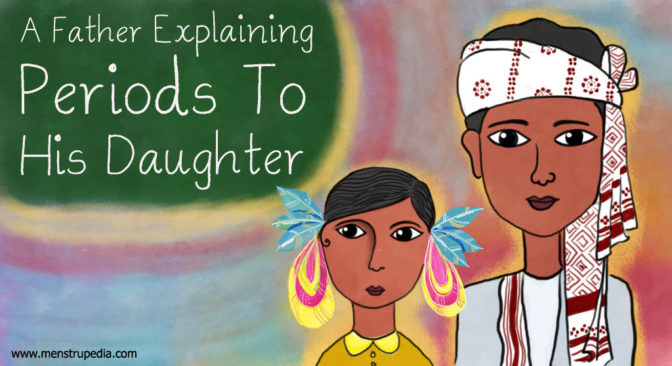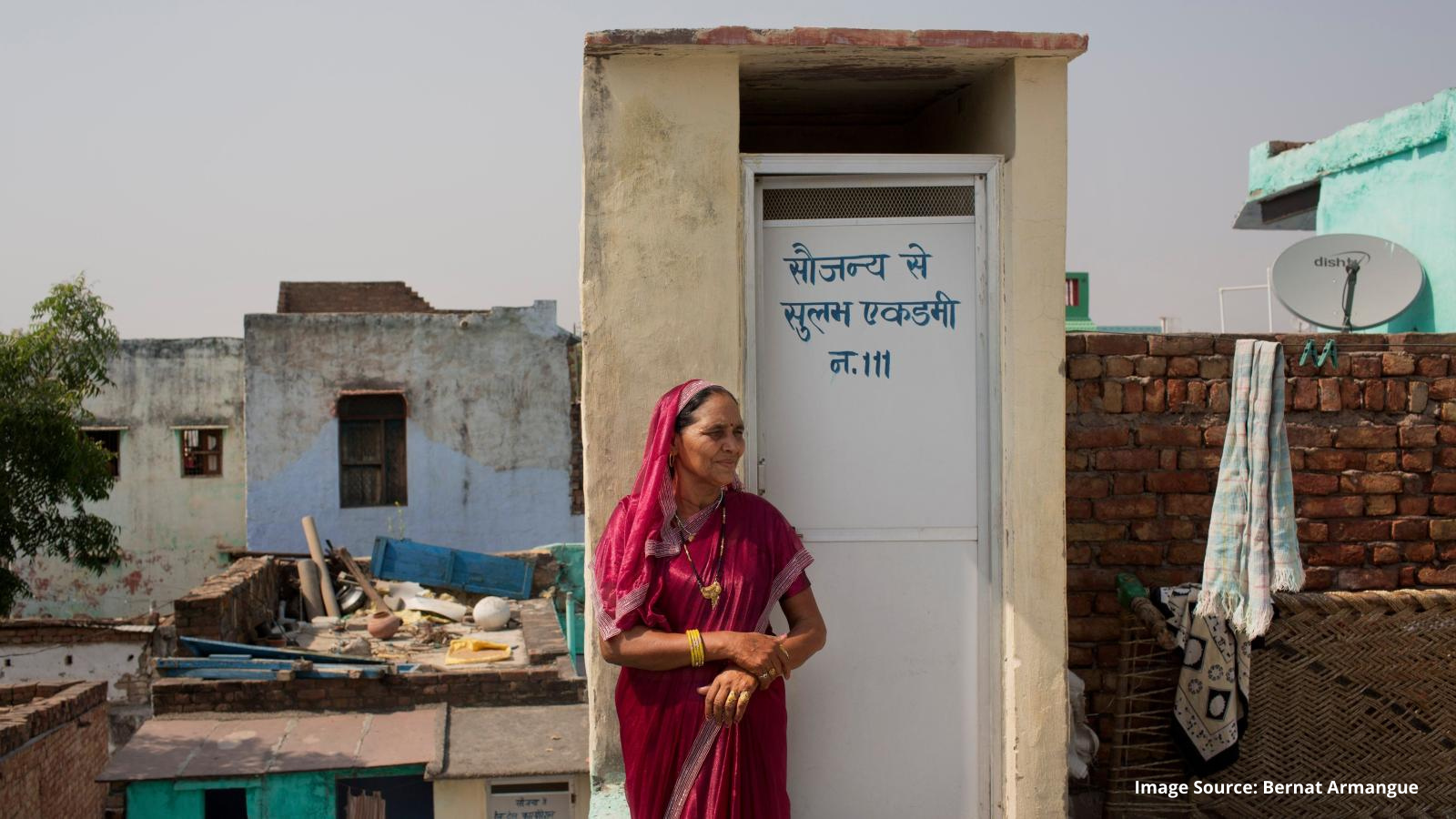(*Nuara is an Assamese term denoting menstruation but it literally means: ‘cannot be done.’)
“Koliyameghedhakiseoidhuniajunormukhonioi…” Sapna was lost in her thoughts about Zubeen’s song while waiting for the mustard oil to heat. Gokul came home running, shouting his wife’s name,“Sapna…Sapna!” She came hurriedly from the kitchen leaving the Kawoi (the local fish of Assam) sizzling in the kerahi (karahi). That morning, Gokul was lucky. He had a very good catch of Kawoimaas(fish). Kawoi being an indigenous fish of Assam and highly in demand, Gokul could fetch good profit from selling them in the local market and yetcould save few for his wife and kids, Babu and Maina. Before Sapna could respond, Gokul sat on a Murha (cane – stool) and said, “Something very strange happened today! We were in Bhodreshwar’s field helping him to clear it when Gogoi’s son came running and said to his father that his younger sister was bleeding from the stomach! Gogoi ran towards his home and we too followed him. By the time we reached,Mimi, Sumi, Torali and some other women were already there. Torali came to us and told us that Gogoi’s daughter has ‘come of age.’ I did not understand what she meant so I asked Torali about it! She shyly told me,“You have a daughter and it is better you ask your wife!”“Aei! Mur maaskeita…!”Sapna ran into the kitchen suddenly remembering the Kawoi fish she had left unattended. From the kitchen she shouted, “O’Maina’s father, take the rest of the day off and I will explain everything.”He took the murha to the kitchen andsat near Sapna.“Emandinor pa koi aasu…” Sapna was murmuring something when Gokul interrupted her and requested her to ease his worry. “Oi, Ko soon….pilease…”(please tell).
“Ro hoi!” (Help me with the cooking first.) She smiled.“Get me some PalengXaak(palak)andkonbilahi (cherry-tomatoes) from the back garden.”Gokul, unlike the other men in the village had liberal views. Every woman of the village wished their husbands to be like him…a home-maker!
Later that evening, while sipping lal-chawith till-pitha (red tea with sweet made of ground rice) served in baan-bati (bell-metal bowl) his wife talked about menstruation. She also told him about the rituals that his daughter would have to follow during her periods.
Gokul decided and told his wife, “I will not let Maina follow these redundant rituals. I will learn from Chowdhury Sir (the local school’s Biology teacher) about it and educate her my way so that she doesn’t have to face any embarrassment because of the‘misconstructions’of our society.”
One night after dinner,when Gokul was lying under the clear sky in their sutal (extended verandah) he said to Sapna, “Do you know, even our daughter’s books will not help her to learn about okhubhidha(a term in Assamese used to indicate menstruation but it literallymeans ‘problem’) at the time she is required to know about it. Their textbooks don’t discuss the rituals, hygiene or problems that a girl faces during her periods. ChowdhurySir told me that even for teachers, it is tricky to discuss this in class!”
“Kintu, aitu to bhogoban’orbordan! Prokritiniyom! Amy kiyolaajpabolage?” (It is a gift of God… a law of nature… why should we be ashamed of it?). I will talk to Babu and Maina. Her brother should also know about it so that he can help his sister and you or any other lady when needed.
After cooking dinner, Gokul was waiting for his kids and wife to return from Namghar(Assamese place of worship).He went near thenongola(bamboo-gate) and saw somebody holding a lamp coming towards him. “Awh! ahila!” (You have come). Come, I have something important to discuss with you. Sapna, I want your presence too!” He made them sit on the shitalpati(mat made from murta plants or cane) and said, “Kids! You two are growing and soon you will pass through adolescence. As Chowdhury Sir told me, during this phase you will see many changes in yourself, especially in your body. Your voice will change, you will notice hair in your underarms, legs, hands and also in your pubic region.” He tried to ease their discomfort in talking of these matters with their father by being as friend-like as possible. “Both of you will notice different changes at different times. But that’s ok. It is a part of growing up.”
“Now, Maina, one day you may notice blood in your undergarment. Remember about Gogoikhura’s (Gogoi uncle’s) daughter? But don’t worry. It is called menstruation. In Assamese, we use the term nuara or mahekiya. Even your mother has it every month. See, these are sanitary pads. You put them in your undergarment so that you don’t stain your clothes. Sometimes, during periods, you may have cramps or may feel sick. Don’t worry if your mother is not around. You can come talk to your brother and me but beta, don’t be under any pressure. Take your own time to be comfortable with the matter and with us.”
“After the incident at Gogoi’s, I have been trying to talk to some of my cousins, and most of them were caught unaware upon the onset of menarche. It is very sad to know that despite having female family members, some of them were unaware about menstruation and some hadn’t even heard the term ‘periods’ before the ‘surprise visit’! Even I found it hard to talk about it to some of my sisters. So, both of you remember, it is about creating a comfortable and conducive environment for spreading correct knowledge about menstruation so that girls/women aren’t embarrassed to talk about it but can share and celebrate their shared experiences of womanhood.”
“Remember, your mother and I love you both. We being illiterate may not be able to answer all your questions, but I will definitely make sure to find someone who can answer your questions.”
“Now, let’s have dinner. Duck curry is waiting for you…”
 Author: Gyanam Saikia
Author: Gyanam Saikia
Gyanam hails from Guwahati, Assam. He is passionate about working towards removing the senseless taboos that are rampant in our society, specially affecting women and children.
You can read other articles from him here
Illustration by Aditi Gupta.








